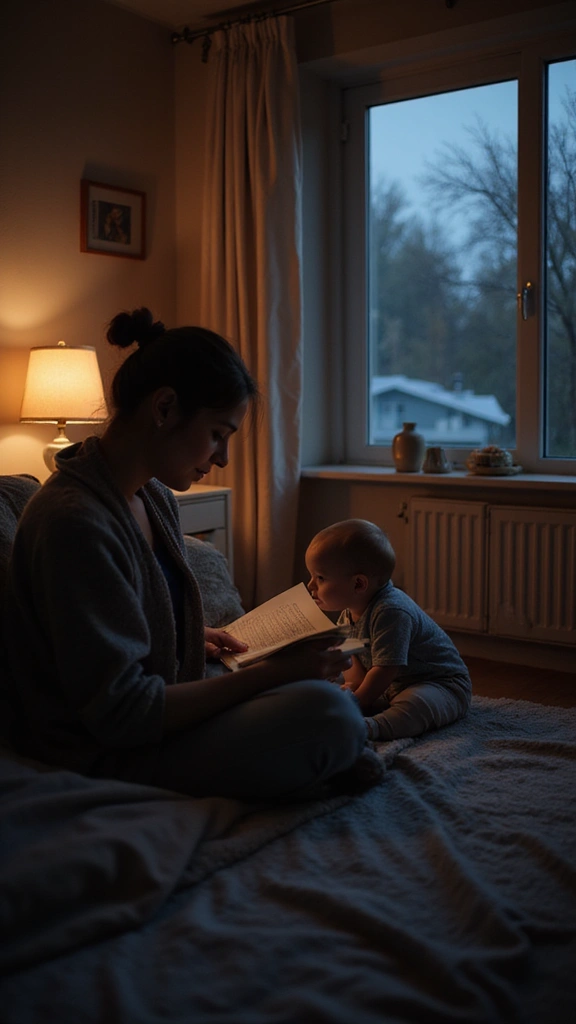
Getting your little one to sleep can feel like an impossible task at times. Between the midnight feedings, diaper changes, and endless lullabies, it seems like peaceful nights are just a dream. But fear not, fellow parents! With the right baby sleep tips, you can turn those sleepless nights into restful slumbers.
From establishing a bedtime routine to understanding your baby’s sleep cycles, these tips will help you find a rhythm that works for you and your baby. Get ready to kiss those sleepless nights goodbye and embrace the soothing silence of a sleeping baby. Let’s dive into these tips that can change your nights for the better!
1. Establish a Bedtime Routine

Creating a consistent bedtime routine can signal to your baby that it’s time to wind down for the night. Think of it as a mini ritual that prepares them for sleep. Start with a warm bath, followed by some cozy snuggling and a soothing story.
The predictability of a routine helps babies feel secure. Just like adults, they thrive on familiarity. Try to keep it short and sweet—30 minutes to an hour should do the trick.
Here are a few tips for a successful bedtime routine:
– Keep the environment calm and quiet.
– Use dim lighting to create a sleepy atmosphere.
– Avoid stimulating activities close to bedtime.
– Incorporate gentle massage to help relax your baby.
Over time, your baby will start to associate these calming activities with sleep, making it easier for everyone to settle in for the night.
2. Create a Sleep-Conducive Environment

Your baby’s sleep environment plays a huge role in how well they slumber. Aim for a dark, quiet, and cool room. Consider using blackout curtains to block out any distracting light and a white noise machine to drown out any household sounds.
Here are some tips for optimizing sleep space:
– Maintain a comfortable room temperature, ideally between 68°F to 72°F.
– Keep the crib free from toys and blankets to reduce risks of suffocation.
– Use a firm mattress for safety and comfort.
– Ensure that your baby’s sleep area is free from any bright colors and busy patterns which might be visually stimulating.
A peaceful setting will help cue your baby that it’s time for sleep, aiding in those peaceful nights you’ve been dreaming of.
3. Follow Your Baby’s Sleep Cues

Every baby is different, and learning to recognize your baby’s sleep cues is key. Look for signs like yawning, rubbing eyes, or fussiness. These cues indicate they’re ready for sleep, so don’t wait too long to act.
Responding promptly to these signals can help prevent overtiredness, which can make it harder for your baby to fall asleep. Here’s what to keep an eye out for:
– Yawning
– Eye rubbing
– Fussiness or irritability
– Staring off into space
– Arching back or turning head away
Remember, the earlier you catch these signs, the smoother the transition to sleep will be. Trust your instincts and be attentive—it makes a world of difference!
4. Limit Naps Throughout the Day

Naps are important for your baby’s development, but too many naps can interfere with nighttime sleep. If your baby naps too long or too close to bedtime, it may be difficult for them to settle down at night.
Aim for a balanced nap schedule:
– Younger babies may need 3-4 naps a day.
– As they grow, transition to 2 naps, and eventually to 1 nap.
– Keep naps shorter than 2 hours to avoid disrupting nighttime sleep.
– Schedule naps earlier in the day rather than close to bedtime.
Adjusting nap times can be tricky but is essential for achieving that sleep routine you crave. It’s all about finding the right balance!
Naps can be a double-edged sword for your baby! Keep daytime snoozes under 2 hours and schedule them earlier to pave the way for peaceful nights. It’s all about balance!
5. Use a Swaddle for Newborns

Swaddling can provide a sense of security and comfort to newborns, mimicking the snugness of the womb. This technique can help reduce startle reflexes that might wake your baby during sleep.
Here’s how to swaddle correctly:
– Use a lightweight, breathable fabric to prevent overheating.
– Ensure the swaddle is snug but not too tight around the hips.
– Allow room for the legs to move and bend–this is important for healthy hip development.
– Gradually transition away from swaddling as your baby shows signs of rolling over.
When done right, swaddling can be a game changer for those early months. Your baby will feel secure, and you’ll both enjoy better sleep!
6. Encourage Self-Soothing Techniques

Helping your baby learn to self-soothe is crucial for their sleep journey. This skill allows them to fall asleep independently rather than relying on external help like rocking or feeding.
Start by giving them a chance to settle down on their own when they wake up at night. You can:
– Allow a few minutes for them to fuss before intervening.
– Use a pacifier or soft toys to provide comfort.
– Gradually reduce your involvement during bedtime to encourage independence.
Keep in mind that this takes time and patience. Each baby is unique, and some may take longer than others. But fostering this skill will lead to happier sleep hours for everyone involved!
Encouraging your baby to self-soothe is like giving them a gentle nudge toward independence. A few minutes of patience can turn nighttime fussing into peaceful slumber—trust the process!
7. Monitor Feeding Schedules

Feeding schedules play a pivotal role in your baby’s sleep patterns. Ideally, ensure that your baby isn’t going to bed hungry. For newborns, a feeding schedule can help establish a routine, making it easier for you to predict sleep times.
Here are some feeding tips:
– Cluster-feed in the evenings if your baby is fussy or restless.
– Avoid feeding right before bed to prevent spitting up or discomfort.
– Gradually space out nighttime feedings as your baby grows.
By aligning feeding schedules with sleep routines, you can maximize those peaceful nights and ensure your baby is content before sleeping.
8. Be Mindful of Overstimulation

In today’s world, it’s easy to overstimulate your little one with bright lights and loud noises. This stimulation can make it difficult for babies to settle down at night. To help your baby unwind, turn off screens and keep activities calm as bedtime approaches.
Consider these points:
– Dim the lights an hour before bedtime.
– Engage in quieter play like reading or gentle rocking.
– Keep the environment peaceful with soft music or white noise.
Teaching your baby to relax before bed is just as important as putting them to sleep. Creating a calm atmosphere will help set the stage for peaceful nights!
A calm environment can make all the difference at bedtime. Dim the lights and swap out the noise for gentle sounds—your baby will thank you with peaceful slumbers!
9. Create a Consistent Sleep Schedule

Consistency is key when it comes to baby sleep. Aim to put your baby to bed and wake them up at the same time each day. This regularity helps regulate their internal clock and can lead to better sleep quality.
To maintain a consistent schedule:
– Choose a bedtime that allows for enough sleep, usually around 7-8 PM for most babies.
– Avoid significant changes on weekends or during holidays.
– For early risers, try gradual adjustments instead of abrupt changes.
A consistent sleep schedule can prevent sleep regressions and lead to happier days for both you and your little one!
10. Use Light Wisely

Light plays a significant part in a baby’s sleep-wake cycle. Natural light exposure during the day can help regulate their circadian rhythm, making it essential to create a day/night contrast. During the day, expose your baby to bright, natural light, while keeping nighttime dark.
Here are some tricks:
– Open curtains during the day to let sunlight in.
– Use a dim nightlight for nighttime feedings or diaper changes.
– Keep the room dark during nighttime sleep to signal it’s time to rest.
Using light effectively can help your baby differentiate between sleep and wake times, ultimately leading to more peaceful nights.
11. Keep Bedtime Calm and Relaxing

The energy level during bedtime can significantly impact how quickly your baby settles down. A calm approach is vital, so consider winding down with relaxing activities.
Make bedtime a peaceful experience:
– Offer a gentle massage to soothe your baby.
– Sing soft lullabies or play calming music.
– Avoid high-energy games or play right before bed.
The calmer the atmosphere, the easier it will be for your baby to drift off to sleep. Emphasize the quiet and cozy aspects of bedtime to create a serene environment.
12. Stay Consistent with Sleep Training

Sleep training can be a daunting process, but staying consistent is crucial for success. Whether you’re using the Ferber method or gentler techniques, the main goal is to help your baby learn to fall asleep without assistance.
Keep in mind:
– Choose a method that feels right for you and your baby.
– Be patient and remember that every baby learns at their own pace.
– Stick to the plan and give it time before assuming it’s not working.
With determination and consistency, sleep training can lead to successful nights of peaceful sleep for your baby.
13. Be Patient with the Process

Patience is key when it comes to getting your baby to sleep through the night. Each child is different, and what works for one may not work for another. Expect some trial and error along the way, and don’t be discouraged by setbacks.
Remember:
– Celebrate small victories, like a half-hour longer sleep.
– If progress stalls, reassess your routine and adjust as needed.
– You’re not alone—most parents go through this journey of learning to sleep train their little ones.
Being patient allows you to build a better understanding of your baby’s needs and helps you develop a more effective sleep strategy over time.
14. Seek Help if Needed

If you’ve tried everything and still struggle with your baby’s sleep, don’t hesitate to seek help. Sometimes, external factors or sleep disorders may be at play. Consulting your pediatrician can provide insights or referrals to sleep specialists if necessary.
Additionally:
– Join parenting groups or online forums for support and shared experiences.
– Consider hiring a sleep consultant for personalized guidance.
– Don’t be afraid to ask for help from family or friends who can provide extra support.
Remember, it’s important to prioritize both your baby’s sleep and your own well-being. You’re doing an excellent job, and seeking help is a sign of strength!
When sleep feels out of reach, remember: it’s okay to seek help! Connecting with professionals or fellow parents can turn sleepless nights into peaceful dreams. You’re not alone on this journey!

Navigating the world of baby sleep can be a challenge, but with these tips in your parenting toolkit, you’re well on your way to peaceful nights. Remember, each baby is unique, and finding what works best for you might take some time. Don’t hesitate to be flexible and adjust your approach as needed.
Sleep is vital for both you and your baby, so embrace the journey. Share your experiences and strategies with other parents—sometimes, a supportive community is all you need to find your rhythm.
Frequently Asked Questions
What are the best bedtime routines for helping my baby sleep?
Establishing a consistent bedtime routine is key to helping your baby settle down for the night. A warm bath, followed by gentle lullabies or storytime, can signal to your little one that it’s time to sleep. This mini ritual not only calms them but also creates a comforting atmosphere that promotes peaceful nights.
How can I recognize my baby’s sleep cues?
Learning to recognize your baby’s sleep cues is essential for timely naps and nighttime sleep. Watch for signs like yawning, eye rubbing, or fussiness. These signals indicate that your baby is ready for sleep, so it’s important to act quickly to maximize their chances for a good night’s rest.
What role does the sleep environment play in my baby’s sleep quality?
Your baby’s sleep environment is crucial for their sleep quality. Aim for a dark, quiet, and cool room. Consider using blackout curtains to block out distracting light and a white noise machine to create a soothing background sound. A comfortable sleep setting can significantly enhance how well your baby slumbers through the night.
How can I help my baby learn to self-soothe?
Encouraging your baby to learn self-soothing techniques is vital for their sleep journey. Start by allowing your baby to fall asleep independently without relying on rocking or feeding. Gradually give them time to settle down on their own when they wake up during the night. This skill can lead to more peaceful nights for both you and your baby!
When should I seek help if my baby struggles with sleep?
If you’ve tried various baby sleep tips and your baby continues to have sleep difficulties, it may be time to seek help. Consult your pediatrician to rule out any underlying sleep disorders or external factors affecting your baby’s sleep. Remember, each baby is unique, and sometimes professional guidance can make all the difference.
